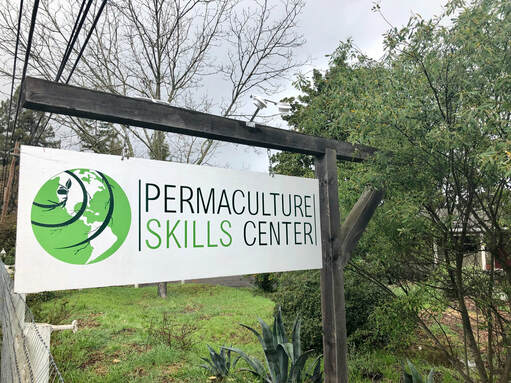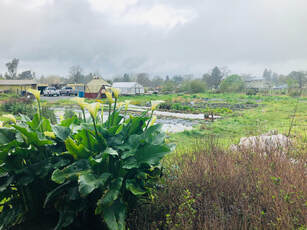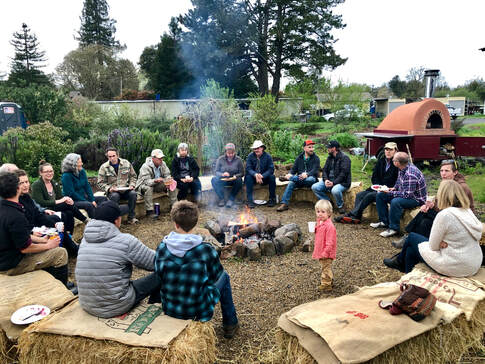Permaculture Skills Center
 The terminator seed, formally known as Genetic Use Restriction technology, would render seed saving impossible due to a sterile second generation. News of this development in genetic modification germinated Erik Ohlsen’s path into environmental activism and regeneration: “I remember we were learning about this and we were 18 years old, about seeds and plants and that a seed was going to be released with sterile pollen and if it got out into the world it could sterilize the vegetation of the planet and the biosphere could collapse. Kind of having an ‘ah-ha!’ awakening moment of ‘holy s*#%t, there is stuff happening in the world that is so devastating, why would we do anything but try to be a solution to that?”
The terminator seed, formally known as Genetic Use Restriction technology, would render seed saving impossible due to a sterile second generation. News of this development in genetic modification germinated Erik Ohlsen’s path into environmental activism and regeneration: “I remember we were learning about this and we were 18 years old, about seeds and plants and that a seed was going to be released with sterile pollen and if it got out into the world it could sterilize the vegetation of the planet and the biosphere could collapse. Kind of having an ‘ah-ha!’ awakening moment of ‘holy s*#%t, there is stuff happening in the world that is so devastating, why would we do anything but try to be a solution to that?”
So, at the young age of 19, Erik and his friends started an organization called Planting Earth Activation giving heirloom seeds away in events they dubbed the “Great Garden Giveaway.” His goal was to create an abundance of heirloom open-pollinator seeds as a solution to the news released of Genetic Use Restriction technology. The group would focus on one neighborhood at a time and plant 6-10 gardens in a weekend using all donated materials and seeds. Over 40 people volunteered each weekend and they transitioned one lawn after another. Musicians and dancers would perform and the group would celebrate with a big potluck where many neighbors met each other for the first time.
While running Planting Earth Activation, Erik and four of his friends travelled to Seattle in 1999 to gather donated seeds and also attend a World Trade Organization meeting protest. According to Erik, “that was a life-changing moment. I had never been in a really big protest before and I was just learning about what the World Trade Organization even was and the more that I started to learn about it, the more fear and grief for the world sprouted up in me…that was a very intense time. I remember one of the first big days of the actions, I had no idea what to expect. We get down into the city and all of the activist blockades were already up and there were riot cops on every corner…And so we joined the civil disobedience and blockaded the delegates from getting to the World Trade Association meeting. There was one instance where I remember I was walking down the street and there were all these monarch butterfly puppets and all of these sea turtle puppets and I look around and every race is in the streets with me. There are punks and there are people wearing suits and there’s people with their children and there’s every age – grey haired people and kids – and then in front of me, there is a wall of police officers and they are shooting tear gas at us and it was that moment where something inside me changed. I realized at that time ‘here is a representation of people and life on the planet here in the streets together and there is the corporate empire that is protected by these weapons.’”
Erik then formed an organization called Green Block and spent years traveling the world building gorilla gardens, distributing heirloom seed balls, and more at civil disobedience protests. He then experienced a major burnout in 2005 and developed a chronic nervous system illness that he is still coping with today. Suddenly he couldn’t travel and fight in the front lines for global justice, and he underwent a crisis in identity. Like a true permaculturalist, however, he turned the problem into the solution and developed the Permaculture Skills Center (PSC) in 2012.
 The PSC is a five-acre demonstration garden and farm that had been neglected for decades and was dominated by invasive bunch grass. It now hosts a food forest, over 2,000 feet of water harvesting swales and raingardens, water harvesting habitat ponds, over 300 fruit and nut trees, and various hedgerows. Erik had purposely looked for a site on the highway that was easy to find, accessible, and close to the Bay Area of California. In addition to trainings and self-guided tours, multiple ecologically-based organizations work out of the site. This includes businesses such as Erik’s Permaculture Artisans (a landscape design contracting company installing permaculture regenerative systems at all scales throughout California. Erik has hired around 20 employees representing a mix of cultures and languages) and Transition United States (providing support for transition initiatives across the nation).
The PSC is a five-acre demonstration garden and farm that had been neglected for decades and was dominated by invasive bunch grass. It now hosts a food forest, over 2,000 feet of water harvesting swales and raingardens, water harvesting habitat ponds, over 300 fruit and nut trees, and various hedgerows. Erik had purposely looked for a site on the highway that was easy to find, accessible, and close to the Bay Area of California. In addition to trainings and self-guided tours, multiple ecologically-based organizations work out of the site. This includes businesses such as Erik’s Permaculture Artisans (a landscape design contracting company installing permaculture regenerative systems at all scales throughout California. Erik has hired around 20 employees representing a mix of cultures and languages) and Transition United States (providing support for transition initiatives across the nation).
Regarding skills building, Erik remembers “really clearly this one day I went out to dinner here in town and the waiter was like ‘oh hey, you taught my permaculture course’ and we had a little chat and I remember him saying something like ‘all I want to do is permaculture but I can’t figure out a way to make a livelihood doing it so I’ve gotten back into waiting tables and I just work my garden on the weekends.’ And that’s a story I kept hearing over and over again. Being in the permaculture movement so long you start to wonder ‘why aren’t the solutions more widespread? Why aren’t we implementing them at large scales when the crisis is so huge? Why are we not meeting the need to regenerate at that scale?’ And for me, one of the things I realized was that without having a more professional angle to doing this work, a way for people to have careers and livelihoods, it was always going to be more-or-less nonrelevant to most people.”
Given the common scenario Erik experienced at a restaurant that day, the Permaculture Skills Center focuses its efforts on empowerment, with the mission “to empower students with the knowledge and skills to create regenerative and resilient ecosystems, communities, and economies.” In addition to on-site trainings and opportunities, online courses include a “Regenerative Landscape Business Training,” “Regenerative Agroforestry,” and an “Eco-Landscape Mastery School.” These types of job-building trainings are a major driver for Erik, given that “so many folks that get turned on to this work, that feel the grief of the world and the weight of our responsibility to take care of earth and people, struggle in finding a way to make a life doing that. They are stuck in the economic system that we are in.”
When walking away from a PSC experience, Erik says “one thing that I hope people would take away with them is a feeling of empowerment that they can make a life regenerating the planet.” He goes on to include “that they feel like they’ve got a set of tools that is more than just concepts. That they feel like they have a feeling of competence around the tools of land regeneration or starting a small business. There’s competence there, it’s not foreign and elusive.”
Many pieces of Erik’s journey resonated directly with me. I recall when news of the terminator seed was released. I was walking mono-cropped fields as a farmer’s co-op employee, making recommendations to spray and ensuring the herbicides had worked effectively, and had already accumulated many questions about our degenerative model of industrial agriculture. There comes a point when it is too much. You know too much, your heart has broken too deeply, but the shattered pieces reconfigure into action and guide you down an alternative path. Your knowledge becomes power in enacting positive change.
Our interview brought us both to tears. The pain of social injustice and environmental destruction is still close enough to the surface that it wells up, like a fresh water spring feeding life into our collective efforts towards an alternative future.
To discover more about Erik and the Permaculture Skills Center, visit: https://permacultureskillscenter.org/

Recent Posts

